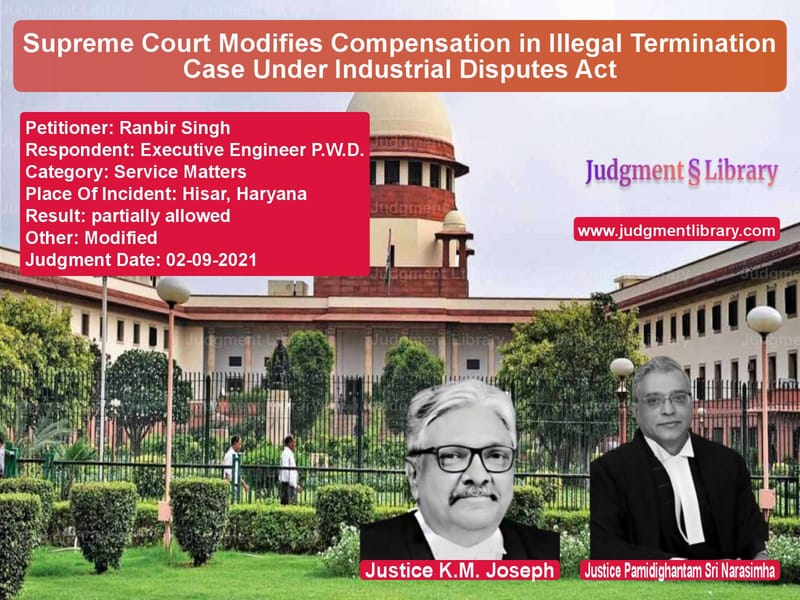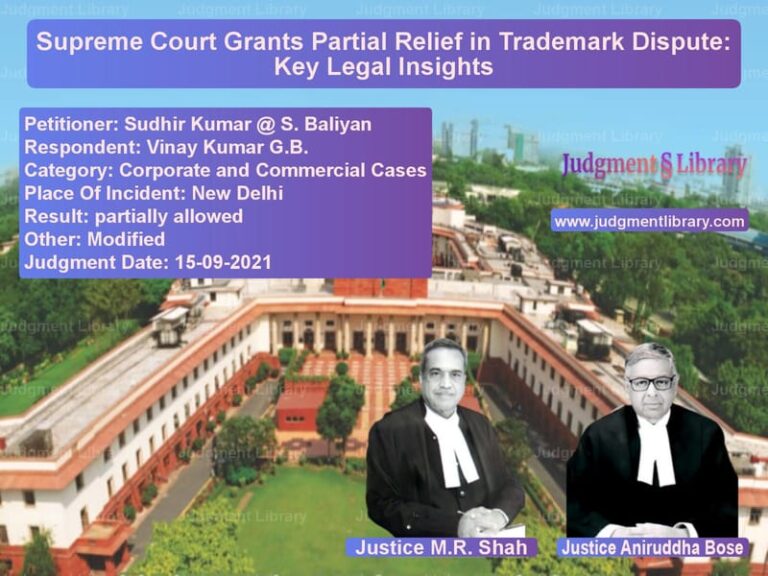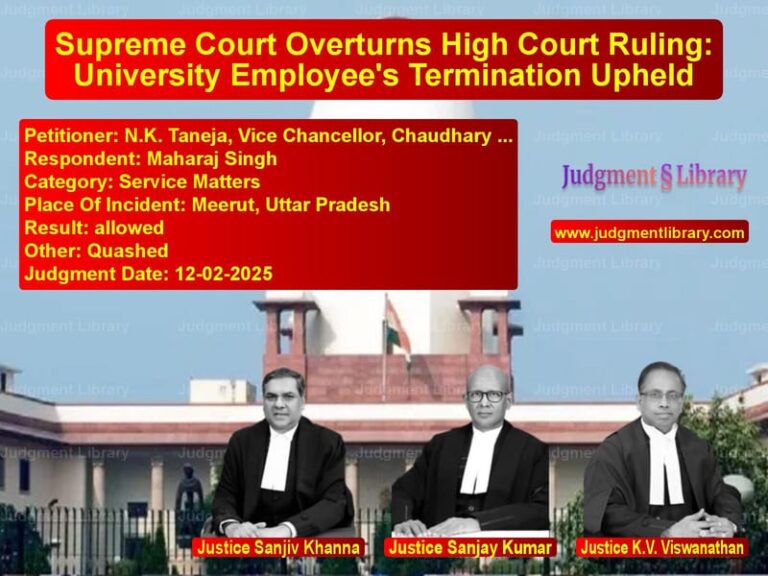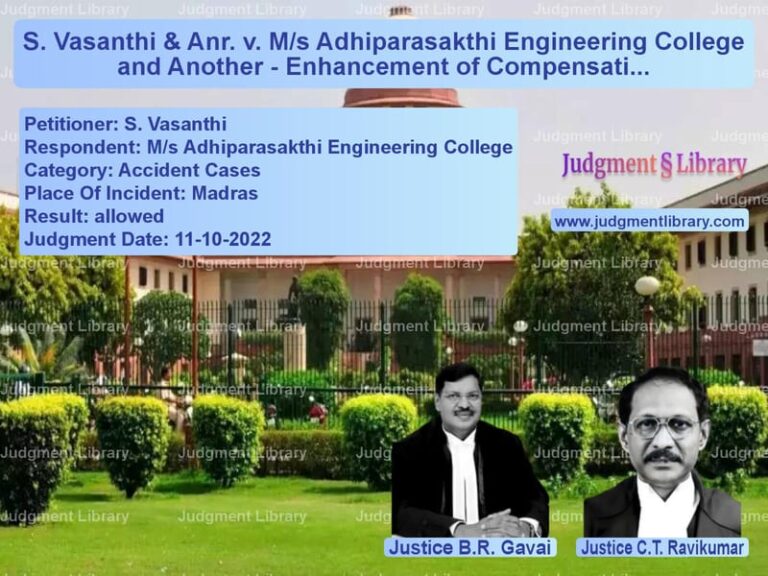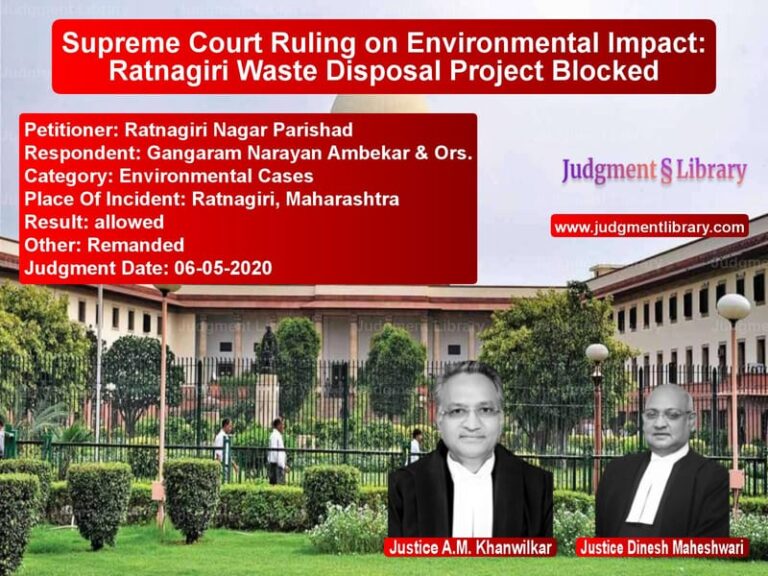Supreme Court Modifies Compensation in Illegal Termination Case Under Industrial Disputes Act
The case before the Supreme Court involved a labor dispute concerning the illegal termination of employment. The appellant, Ranbir Singh, challenged the decision of the Punjab and Haryana High Court, which had modified an earlier award by the Labour Court. The key legal question revolved around whether the appellant was entitled to reinstatement or compensation under the Industrial Disputes Act, 1947.
Background of the Case
The appellant claimed that he had worked as a daily wager with the Public Works Department (PWD) for nearly eight years before his services were terminated in 1991. He alleged that his termination was in violation of Section 25F of the Industrial Disputes Act, which mandates certain conditions before an employee can be retrenched.
The Labour Court ruled in favor of the appellant, holding that his termination was illegal due to non-compliance with Section 25F. It ordered reinstatement with 25% back wages. However, the High Court overturned this decision and instead awarded a lump sum compensation of Rs. 25,000.
The appellant, dissatisfied with the compensation, approached the Supreme Court, seeking reinstatement in service or enhanced compensation.
Legal Issues Considered
- Whether the termination of the appellant’s employment was illegal under the Industrial Disputes Act.
- Whether reinstatement was an appropriate remedy or if compensation should be granted.
- The principles governing compensation in cases of illegal termination.
Arguments by the Appellant
- The appellant argued that he had completed more than 240 days of service in a year, making him eligible for protection under Section 25F of the Industrial Disputes Act.
- The Labour Court had correctly found that the termination was illegal, and reinstatement was the appropriate remedy.
- Other employees junior to him had been regularized, making the action against him arbitrary and unfair.
- The High Court’s award of Rs. 25,000 was insufficient and did not adequately compensate for the loss of livelihood.
Arguments by the Respondent
- The respondent (PWD) argued that the appellant was only a daily wager and had no vested right to regular employment.
- The appointment was not made following due process, and therefore, reinstatement would violate the principles laid down in State of Karnataka v. Umadevi (3).
- Even if the termination was illegal, reinstatement was not the automatic remedy, as per recent judicial trends.
- The compensation granted by the High Court was reasonable and in line with judicial precedents.
Supreme Court’s Observations
The Supreme Court, comprising Justices K.M. Joseph and Pamidighantam Sri Narasimha, analyzed various precedents and the factual matrix before arriving at a decision.
- The Court noted that the termination violated Section 25F of the Industrial Disputes Act, as the appellant had worked for more than 240 days in a year.
- However, it emphasized that reinstatement is not an automatic remedy in cases of wrongful termination, especially for daily wage employees.
- The Court cited BSNL v. Bhurumal and State of Uttarakhand v. Raj Kumar, which held that compensation is a more appropriate remedy in such cases rather than reinstatement.
- The appellant had already been reinstated following the Labour Court’s order but was out of service since 2009 following the High Court’s decision.
- The Court observed that awarding mere Rs. 25,000 as compensation was inadequate, given the long period of service.
Final Judgment
The Supreme Court modified the High Court’s order and directed an enhanced compensation of Rs. 3.25 lakhs instead of Rs. 25,000. The key directives were:
- The appellant would not be reinstated in service.
- The compensation amount was increased to Rs. 3.25 lakhs to account for loss of livelihood and service.
- The compensation was to be paid within eight weeks.
- The payment would be a full and final settlement of all claims.
Conclusion
This judgment clarifies the evolving legal position on reinstatement versus compensation in labor disputes. The Supreme Court reaffirmed that while illegal termination must be remedied, reinstatement is not always the best option, particularly for daily wage earners.
By enhancing the compensation, the Court ensured a fair and equitable outcome while upholding the principles of justice. The ruling serves as an important precedent for similar cases where daily wage workers challenge their termination under the Industrial Disputes Act.
Petitioner Name: Ranbir Singh.Respondent Name: Executive Engineer P.W.D..Judgment By: Justice K.M. Joseph, Justice Pamidighantam Sri Narasimha.Place Of Incident: Hisar, Haryana.Judgment Date: 02-09-2021.
Don’t miss out on the full details! Download the complete judgment in PDF format below and gain valuable insights instantly!
Download Judgment: ranbir-singh-vs-executive-engineer-p-supreme-court-of-india-judgment-dated-02-09-2021.pdf
Directly Download Judgment: Directly download this Judgment
See all petitions in Employment Disputes
See all petitions in Termination Cases
See all petitions in Pension and Gratuity
See all petitions in Judgment by K.M. Joseph
See all petitions in Judgment by P.S. Narasimha
See all petitions in partially allowed
See all petitions in Modified
See all petitions in supreme court of India judgments September 2021
See all petitions in 2021 judgments
See all posts in Service Matters Category
See all allowed petitions in Service Matters Category
See all Dismissed petitions in Service Matters Category
See all partially allowed petitions in Service Matters Category

